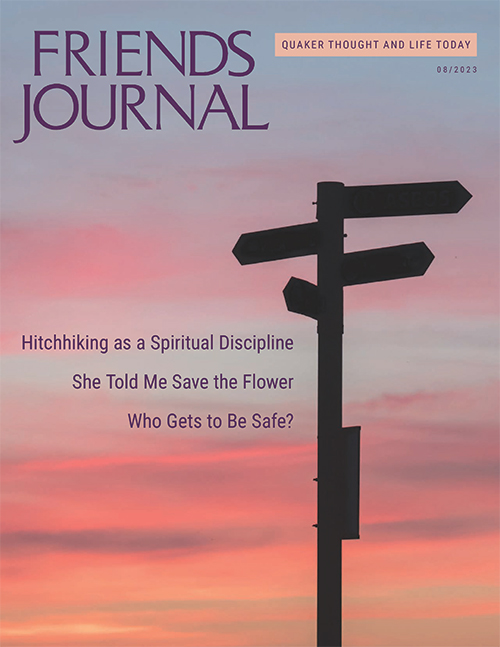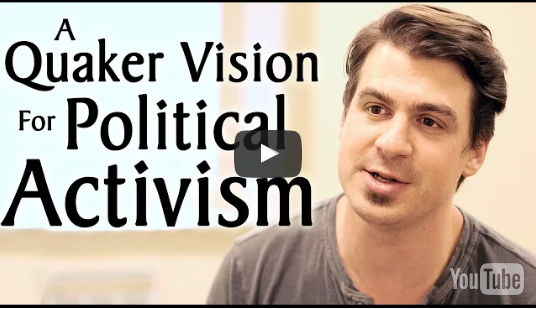Honesty in politics
“Honesty above all” is missing in modern-day political activities (“Why We Need More Quakers in Politics” by Carl Abbott and Margery Post Abbott, FJ June-July). Honesty should be one of the radiant features that all Quakers exhibit in daily activities. I have trouble believing many statements made by most present-day politicians. It is my hope that all Friends will let their Light shine in all activities. If so, it will eventually be recognized (as a positive asset) by the surrounding observers.
Charles M. Earnest
Rome, Ga.
The urging of Friends to get actively involved in their community makes very good sense. It’s not that they should actively recruit people to join Friends (not our way), but that they can bring Quaker values to the table.
However, as a retired headmaster of various prominent independent schools, I know that politicians are only the most visible of public power figures; in fact, they are not always the dominant figures. Behind the scenes are numerous “influencers” (to use the modern term), and I know this because I have met many of them as a result of their having enrolled their children in my schools.
Ralph Jay Dewey
Raleigh, N.C.
The author responds: You’re absolutely right that influencers who work behind the scenes play an important role in public decisions, sometimes with positive results and often to stifle progressive action. In the early twentieth century, prominent Quakers like Rufus Jones, Henry Cadbury, and Elton Trueblood sometimes played the same role, trying to advance a Quaker agenda with figures like Herbert Hoover, but there are few equivalents today. We hope to suggest that being a Friend who engages openly in the political process is a healthier way to bring our values into the public realm.
Carl Abbott
Portland, Ore.
An appeal to “visitarianism”
“Soul Food Reimagined” by Deborah B. Ramsey (FJ May) is a beautifully written homage to food and family. I was struck by the loving way the author described food preparation, including the annual fall butchering, and yet, I could understand a shift later when she described pork-fat soaked beans, etc. I hear the tension in those two and empathize. I had a similar epiphany about animals; I too grew up on a farm. I was watching the documentary Peaceable Kingdom at one of the Baltimore Yearly Meeting’s women’s retreats and now think of myself as a “visitarian”: I choose not to eat meat, but when I’m visiting others, if meat is placed in front of me, I will eat what is given.
Erin Roth
Baltimore, Md.
I have contemplated eliminating meat from my diet now that I am in my 60s, and this article provides an interesting perspective: specifically mentioning the treatment of animals. Eliminating meat is a choice that can be interpreted in a variety of ways by others, and a thoughtful person considers such things. Your thoughts and description of your family’s traditions are appreciated.
Tracy Smith Jr.
Baltimore, Md.
The dreaded potluck
In a dysfunctional family, there is often a lot of effort put into “fixing” the person who is identified as “the problem.” Sharlee DiMenichi’s “Care and Counsel for Friends with Eating Disorders” (FJ May) emphasizes nurture and loving care for the blamed person among Friends.
It is important for my health and well-being that I eat mindfully, with attention to both what I am eating and how much. It is important to my spiritual well-being that I interact mindfully and am fully present with those I am interacting with.
Have Friends considered less emphasis on the chaos, disorder, and uncertainty of the potluck as a primary source of nurturing community? Most meetings accomplish hospitality without including alcohol: how can we be hospitable without the (dreaded) potluck?
Rachel Kopel
San Diego, Calif.
When the beginning isn’t the beginning
I wish author Allen Cochran had caught himself when he wrote in “The Lord Is My Shepherd” (FJ May): “This means that the farm has been in Quaker hands since the beginning, around 1765.” The beginning for whom? The beginning of what? For Friends who want to look deeper into the history of the land, I recommend Louise Dunlap’s 2022 book Inherited Silence: Listening to the Land, Healing the Colonizer Mind and Robin Wall Kimmerer’s Braiding Sweetgrass.
Paula Palmer
Boulder, Colo.
Profiling a beloved meetinghouse
When Chester Freeman’s reflection “A Visit to the Hector Meetinghouse” (FJ June-July) popped up in my inbox this morning, I was delighted to read it again and to recall how much I enjoyed it in print when it first arrived by USPS. While I have yet to visit in person, I have heard about the magical—and yes, mystical—qualities of the Hector Meetinghouse, which are so lovingly detailed in Chester’s reflection. As I write, I recall other meetinghouses and special locations discovered along my path, each of which has spiritual meaning that has added depth and even clarity to my own journey. Truly, this reflection helps me to see more clearly and more deeply. I often see in the pages of Friends Journal graphics and illustrations that enhance the message of the text. In this instance, Melissa Travis Dunham’s photo of the Hector Meetinghouse captures much of what Chester describes. Cherry Rahn’s unique photo of the 1816 Farmington Meetinghouse (seen through a window of Farmington Friends Church across the road) helps me see clearly and from a different perspective. I am grateful.
Lyle Jenks
Rochester, N.Y.
I love the idea of the power and memory that reside in our old benches and especially windows. Your thoughts on this remind me of other old meetinghouses I have visited over my lifetime, such as Wilton, Conn.; St. Andrews, Scotland; and a tiny, old meetinghouse in New Jersey that I visited as a child. I don’t know where it was, but it had a dividing low wall down the middle to separate men and women! It also had a potbelly wood stove for heating, and three or four very ancient Friends. Being there with them was a powerful and beautiful experience.
Cherry Rahn
Farmington, N.Y.
I felt I was beside Chester as he described his visit; I could sense being there as he shared his vision. It’s not far from where I live, so it will have to go on my list of things to do, places to visit. You know, in the post-COVID period, so many have drifted away from God. He is still there; it is we who moved away. We need people like Chester to remind us of our heritage, and we need to remember who made us and has a plan for each of us, if we would stop and listen as he did in his visit. Thank you, Chester, for sharing.
Tom Rood
Penn Yan, N.Y.
Chester Freeman drew me into a holy space with his reflection on this place of worship: “A Visit to the Hector Meetinghouse.” I personally have felt the presence of “a cloud of witnesses” when in an old meetinghouse. The way the light falls on the walls in the silence can stir something in me. I have recently been worshiping at Cedar Grove Meetinghouse in Woodland, N.C. It is hard to put words to this experience. Thank you, Chester, for sharing this.
Mark Moss
Greenville, N.C.
Full of lush imagery, Chester Freeman’s piece on the Hector Meetinghouse is evocative and quietly takes us there. We are reminded of the importance of space, listening, and taking the time to notice.
Mary L. Gardner
Skaneateles, N.Y.





Comments on Friendsjournal.org may be used in the Forum of the print magazine and may be edited for length and clarity.